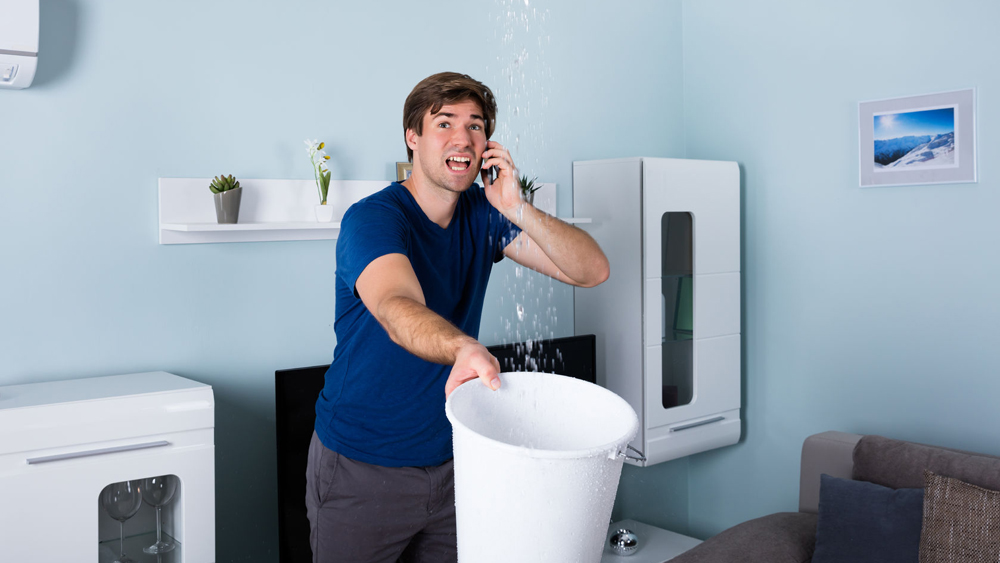Explaining the Six Most Common Causes of Home Water Leaks
Explaining the Six Most Common Causes of Home Water Leaks
Blog Article
What're your thoughts regarding How to detect water leaks in your home?

Leakages not only cause waste of water yet can additionally trigger unnecessary damages to your home and also promote unwanted natural growth. By looking as well as recognizing for daily situations that create leakages, you can protect your residence from future leaks and also unnecessary damages.
Intruding origins
Many water leakages start outside your house instead of inside it. If you notice an unexpected reduction in water stress, say in your faucet, take time to head out and analyze your yard. You could discover damp patches or sinkholes in your lawn, which may suggest that tree origins are getting into water lines creating water to leak out. You can have your plumber look for intrusion, particularly if you have trees or hedges near your building.
Rusty water systems
As time passes by, your plumbing system ages and also corrosion such as rust may begin gnawing the pipes. This may be the source of staining or bending on your pipes. This calls for an evaluation with your plumber quickly. Think about changing the pipelines since they are at a higher danger of rust than the more recent versions if our plumbing system is old.
Defective Pipe Joints
The factor at which your pipelines attach is frequently the weakest link in the waterline. Pipe joints can deteriorate in time, resulting in water leaks. However, the majority of pipeline joints are not conveniently visible. If you have noisy pipes that make ticking or banging noises, particularly when the warm water is activated, your pipeline joints are possibly under a great deal of stress. It is a good idea to have your plumber check your system yearly.
Instantaneous temperature level modifications.
Severe temperature changes in our pipes can create them to broaden and get suddenly. This expansion and also contraction may create cracks in the pipelines, particularly if the temperature are listed below freezing.
Poor Water Connectors
Sometimes, a leak can be caused by loosened hoses and also pipes that provide your appliances. Generally, changing is what triggers the loosened water Connections. You could find when it comes to a cleaning machine, a pipe may spring a leak as a result of trembling throughout the spin cycle. In case of a water connections leak, you may see water running directly from the supply line or pools around your home appliances.
Obstructed Drains
Clogged drains may be frustrating and inconveniencing, but they can often wind up causing an overflow resulting in rupture pipelines. Maintain removing any materials that might drop your drains pipes that could obstruct them to avoid such hassles.
All the above are root causes of leaks yet not all water leaks result from plumbing leaks; some leakages could come from roofing system leaks. All leaks must be fixed promptly to avoid water damage.
Leakages not just create waste of water yet can additionally cause unneeded damages to your house and advertise undesirable natural development. By comprehending as well as looking for daily circumstances that trigger leakages, you can secure your residence from future leakages and also unnecessary damage. Today, we will look at six leakage creates that might be creating your pipelines to drip.
At times, a leak can be caused by loose hoses and pipes that supply your devices. In case of a water connections leak, you might see water running straight from the supply line or pools around your devices.
How To Check For Water Leak In Your Home
How To Check for Leaks
The average household's leaks can account for nearly 10,000 gallons of water wasted every year and ten percent of homes have leaks that waste 90 gallons or more per day. Common types of leaks found in the home are worn toilet flappers, dripping faucets, and other leaking valves. These types of leaks are often easy to fix, requiring only a few tools and hardware that can pay for themselves in water savings. Fixing easily corrected household water leaks can save homeowners about 10 percent on their water bills.
To check for leaks in your home, you first need to determine whether you're wasting water and then identify the source of the leak. Here are some tips for finding leaks:
Take a look at your water usage during a colder month, such as January or February. If a family of four exceeds 12,000 gallons per month, there are serious leaks.
Check your water meter before and after a two-hour period when no water is being used. If the meter changes at all, you probably have a leak.
Identify toilet leaks by placing a drop of food coloring in the toilet tank. If any color shows up in the bowl after 10 minutes, you have a leak. (Be sure to flush immediately after the experiment to avoid staining the tank.)
Examine faucet gaskets and pipe fittings for any water on the outside of the pipe to check for surface leaks.
Undetected water leaks can happen without the home or business owner even realizing. If you suspect a water leak, but not able to find the source. It is time to contact a professional water leak detection service, The Leak Doctor.
How To Find a Water Leak In Your Home
https://www.leakdoctor.com/blog/How-To-Check-For-Water-Leak-In-Your-Home_AE197.html

We hope you enjoyed our post on How to Find Water Leaks. Thanks so much for spending some time to browse our posting. Please take the time to distribute this write-up if you appreciated it. Thank you for your time spent reading it.
Schedule Service Now Report this page